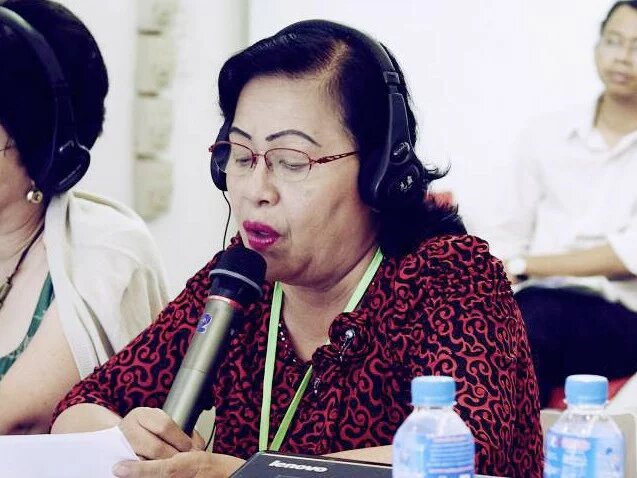
My name is Ung Yokkhoan. I am the director of AMARA. After Beijing 1995, I chose one critical area to work on which was the empowerment of women in politics, because I saw that Cambodian women were still not participating in politics. I would like to lay out for
you what has changed in the last 20 years since Beijing, but before that I will give you an idea of what the situation of women in Cambodia in 1995 looked like.
In 1995, there was a lack of laws and principles on supporting and promoting the participation of women in public affairs and politics. All citizens, but especially women lacked knowledge and confidence in the laws and their implementation. There was no gender equality and equity in government institutions, and women were very shy and fearful of entering public positions as there was a severe lack of role-model women at all levels. The political climate at the time was shaped by uncertainty and unrest. Traditional stereotypes of women put the burden of caring for the family on women, causing females to be hesitant to participate in public and political affairs, and stay at home taking care of the house and children instead. When women did venture outside of the home to work, they experienced discrimination. No women‘s network or motivating political figures existed to encourage women to engage in public affairs and politics.
Following the Beijing conference, gender equality and equity were implemented by the Cambodian government through the following steps. To begin, the Secretariat of Women’s Affairs was replaced by a proper and prestigious “Ministry of Women’s Affairs”, administered by a woman minister and governed with the principles of ‚Neary Rattanak‘ (woman as precious stone) as guidelines. Furthermore, the government passed laws and many principles for supporting and promoting women’s rights in all national areas, including politics. Nowadays, there must always be at least one woman in a high position in all the governmental institutions at the national and sub-national levels. Women hold seats in the senate, the parliament and all other high ranking positions. The government also established “the Cambodian National Council for Women” and the “National Committee to Promote Social Morality, Women‘s Values and the Cambodian Family” in order to encourage women to confidently get involved in leading positions. In general, women are also more informed about political issues, and more able to make their own political decisions, for example during election times. This is partly thanks to women candidates during electoral campaigns.
The government also acknowledged the need for local and international NGOs to get involved in implementing development programs for promoting women’s rights by using all processes such as training, coaching, organizing grassroots meetings, awareness-raising, advocacy and establishing NGO CEDAW for writing shadow reports on women’s issues. The number of women participating in politics has increased at all levels from one mandate to the next. According to AMARA’s Capacity Building Project, women in communities have an improved awareness of human rights, women’s rights, and children’s rights, concepts of democracy, CEDAW, the Cambodian Millennium Development Goals and many other laws relevant to women’s lives. Through this knowledge, women have gained confidence and optimism, making them brave enough to participate in political affairs as female activists of political parties, and potentially volunteer to stand as candidates in local elections. Some women candidates got elected to be female Commune Councilors, and are now engaged in the implementation of commune laws.
Although we have made a lot of progress in advancing women‘s rights in Cambodia since 1995, some threats to women‘s empowerment remain. There are still many women who are not aware of the laws relevant to their daily lives. Women continue to be greatly underrepresented in leadership positions, and discrimination in the workplace affects women disproportionately to men. For example, some females hold the position of Commune Councilor or government official, but the powers have still not been properly delegated to give them the same decision making competencies as their male colleagues have. Women also continue to underestimate and undervalue their own competencies, although they would be suitable for a position. Although a women‘s network and female role models do exist today, they are still not strong enough to encourage more women to be assertive. Despite this, some local women do know how to use their rights and express their opinions at government meetings.
Another challenge for Cambodia’s society is that all types of violence against women are still severe. Although there is awareness raising and information broadcasting, sex trafficking of women caused by poverty is still flourishing. Moreover, many girls are facing difficulties to continue their education until high school and university because of safety problems. On a more positive note, grassroots women are provided with services and supplies for infant and maternal care.
I have several recommendations on promoting gender equality between men and women, and women‘s empowerment in politics. The government should review and strengthen the law enforcement to promote the safety of young women so that they are encouraged to get equal access to higher education. All leaders with decision making capabilities should give government roles and authority to women. All political parties should conscientiously enforce the principals of their gender policy for increasing the number of women participating in politics, in order to respond to all goals of the Millennium Development Goals of Cambodia. And, lastly, the government should enforce
the Law on the Suppression of Domestic Violence in the Families and Protection of the Victims.
This article first appeared in "We have come a long way...but there is still a long road ahead". Voices from Cambodia 20 years after the Beijing Conference (1995), published by Heinrich Böll Stiftung Cambodia.


